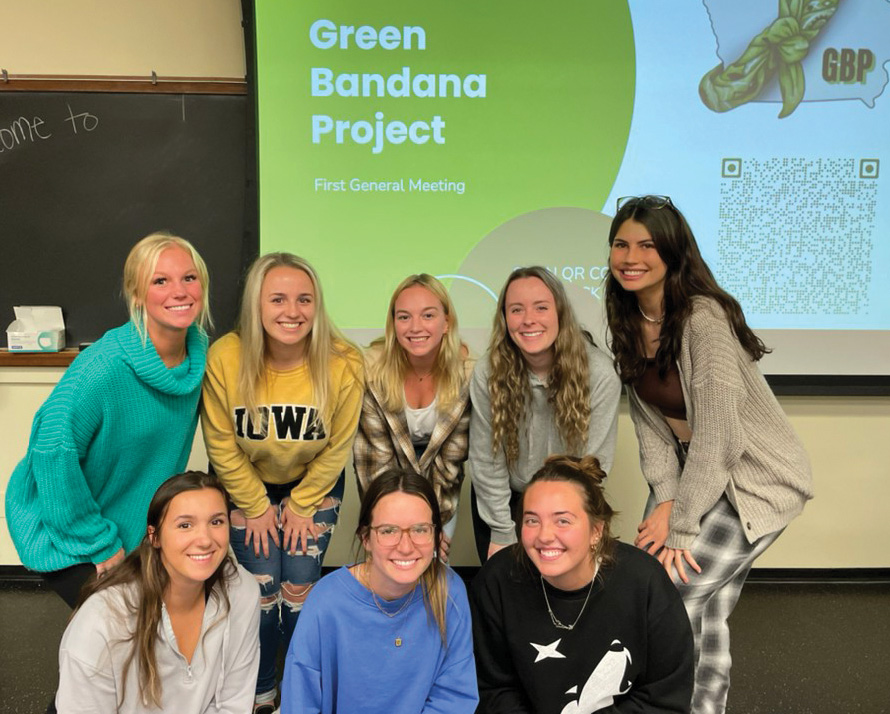College students become mental health advocates through the Green Bandana Project.
In a few months, Olivia Wright is to graduate from the University of Iowa. The senior from Metamora is to take with her a degree in finance and a certificate in event planning.
Wright also is likely to take away a green bandana. On a personal level, that might be just as important as the sheepskin.
The 21-year-old Wright is vice president of the University of Iowa Green Bandana Project. The group’s goal is to increase mental-health awareness on the Iowa City campus.

Wright said she became involved with Green Bandana as a class project in the university’s Event Management Program. But earlier this year, the class project became a full-fledged on-campus club, with the imprimatur of the Iowa administration and the ability to raise funds.
Green Bandana has grown to be more than just a classroom assignment for Wright, too.
“I think that there’s a lot of stigma around mental health, and I want to help lower that stigma and help people feel included,” she said. “I think it’s a change that needs to happen on college campuses, where there’s so much stress with school and trying to balance everything.”
The Green Bandana Project began in 2016 at the University of Wisconsin in Madison. The founder, then-freshman Conlin Bass, had lost an uncle and a close friend to suicide and was looking for a way to normalize the search for mental health assistance.
Bass found it by using a simple piece of cloth.
Students who have a lime-green bandana tied to their backpacks are the linchpins of the project. The bandana signals that they’re knowledgeable about mental-health issues and are open to contact from individuals in need, according to the Wisconsin Bandana Project website.
Project participants are required to complete an interactive suicide-prevention program. They also carry resource cards that have contact information for crisis hotlines and other mental-health organizations.
According to Wright, the bandanas help signify support and solidarity with peers who might be having a tough go of it, in the classroom or elsewhere.
“A lot of students have told us they’d feel more comfortable talking to students their age rather than adults,” said Wright, a 2019 graduate of Metamora Township High School.
That student-to-student interaction appears to have become more important in the wake of the coronavirus pandemic. Although Green Bandana was founded before COVID-19 became part of the worldwide lexicon, Wright suggested the program is tailor made for the pandemic’s psychological after-effects.
Wright began school at Iowa not long before the virus caused campuses nationwide to shut down. Students were subject to remote learning and missed a lot of the extracurricular activities that help form the college experience.
Particularly hard hit are Iowa freshmen, said Wright, as COVID dominated their high school years.
“A lot of them don’t have a very strong support system,” she said. “They haven’t had what upperclassmen would call ‘normal years.’ A lot of them don’t have a lot of friends, so they don’t have that close-knit group of people they can talk to.
“It’s almost been difficult to talk to them. They don’t know how to talk to people. They can’t make eye contact with people.”
Green Bandana at Iowa is attempting to overcome that by conducting events such as “glowga,” a glow-in-the-dark yoga session. A 6-foot beach ball and pumpkins were distributed, upon which group members and others wrote positive mental-health messages. A night at a local bowling facility was planned.
About 80 Iowa students are on the Green Bandana roster, although Wright said the number of active members tends to be lower. The group’s fundraising efforts are just getting off the ground.
“We’re very new to this, so we’re trying to figure it out,” Wright said.
Wright is trying to figure out things for herself, as well, with graduation looming. Until then, she hopes to leave behind a few more green bandanas.
“Advocating for mental health is something I will continue to do no matter where I am,” Wright said.
“I think that a lot of people have really felt moved by the cause. The (members) over the next five years, they’re going to totally outshine us. We’re figuring out all the bumps for them, and I think it’s going to have a really positive impact.





